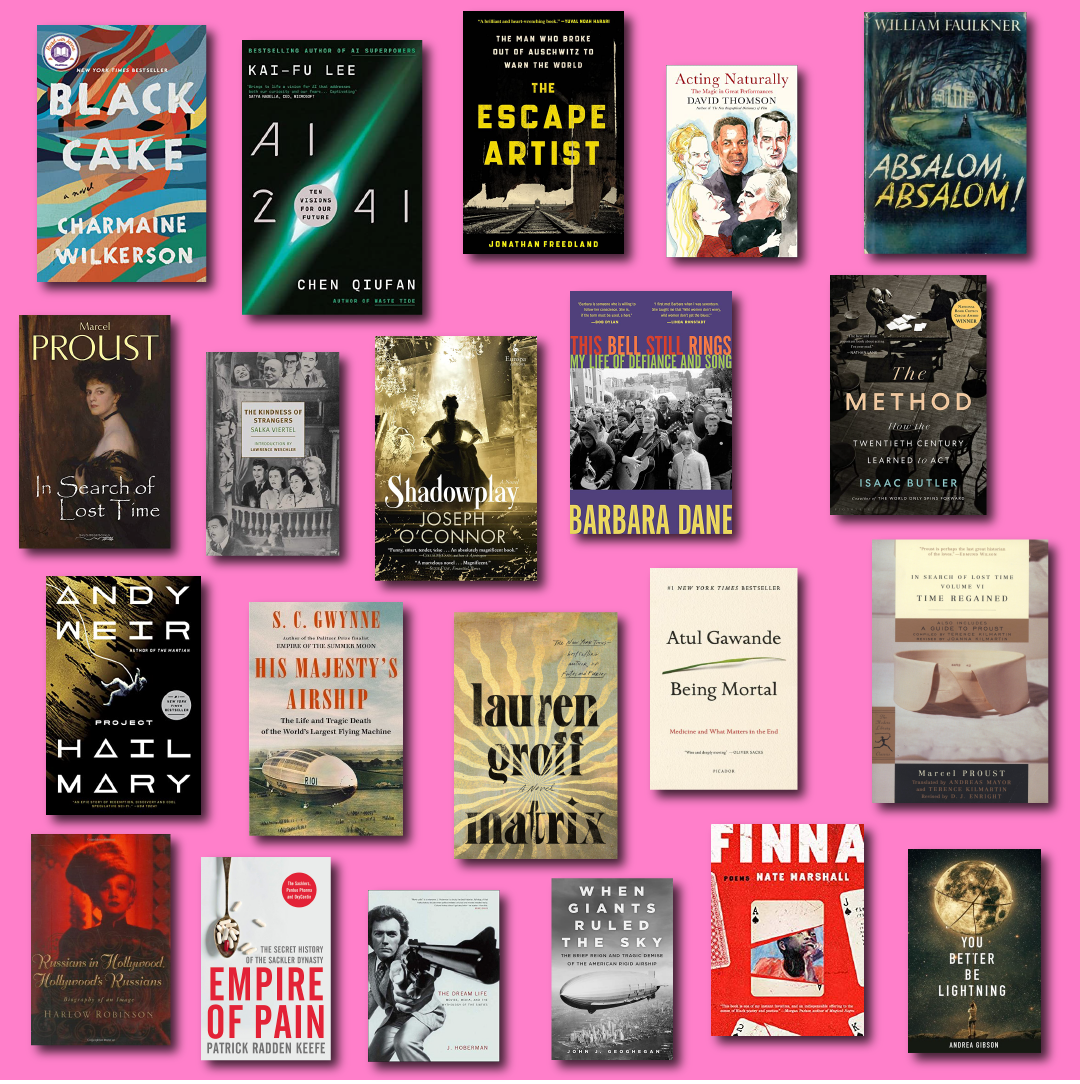
With summer here, we decided to ask faculty to recommend books they've recently read and loved, and to explain why. Feel free to steal their choices as we wade deep into beach-reading season.
Gibor Basri
Project Hail Mary, by Andy Weir
If you liked The Martian this is another novel where someone "sciences" their way out of increasingly serious crises. But this takes place out among exoplanets, and involves a lone survivor trying to save the Earth (and aliens). The fundamental energy physics isn't very plausible, but the rest mostly makes sense.
George Breslauer
The Escape Artist, by Jonathan Freedland
It is the little-known, but absolutely amazing, true story of a man who managed to escape from Auschwitz, make it back on foot to his native Slovakia, write up details of the genocide occurring inside that concentration campus, and get this document before both Prime Minister Winston Churchill and President Franklyn D. Roosevelt. The book is extremely well written and reads like a thriller; at times, you can hardly believe you are reading non-fiction! For those so inclined, the audiobook is read very dramatically and effectively by the British-accented author himself.
Linda Carucci
Black Cake, by Charmaine Wilkerson
An evocative, well-written novel about family ties. A dead mother's last wish before her funeral is for her estranged children to convene in the presence of her attorney to listen to a recording she'd taped that reveals secrets of her life--and compelling them to eat her famous Jamaican black cake that she stored in the freezer for them to eat together. Set in present day. Everyone in my book club loved this.
Matrix, by Lauren Groff
A blurb from NPR: "An inspiring novel that truly demonstrates the power women wield, regardless of the era. It has sisterhood, love, war, sex...Quite impossible to put down." Everyone in my book club loved this book.
Harry Chotiner
The Method: How the Twentieth Century Learned to Act, by Isaac Butler
A history of method acting...where it came from (who's this Stanislavsky guy anyway?), what were the ideological fights about between Lee Strasburg and Stella Adler, and does it make sense to think of movie acting like the calendar — there's BC and AD, there's pre-Brando and post-Brando? It's all here...and readably fun.
Karen Davis
In Search of Lost Time, by Marcel Proust (1981 edition)
For those of us who have picked up (and put down) Proust's 6-volume In Search of Lost Time, I've just discovered the 1981 re-working of the original Moncrieff translation by editors Kilmartin and Enright — and it's wonderful! I've read about a more recent translation, but I think this one, which utilizes Moncrieff as an armature, is the one for me.
Art Eckstein
The Dream Life: Movies, Media, and the Mythology of the Sixties, by James Hoberman
An explanation of the merging of politics with media, to create a world where Vietnam is just a bad television show.
Absalom, Absalom!, by William Faulkner
THE great American novel, imho—dealing with THE central trauma in American history. Faulkner is much out of favor nowadays. Too bad.
Pete Elman
Empire of Pain, by Patrick Radden Keefe
Because it's timely, well-written and historically and culturally important.
Michael Fox
Acting Naturally, by David Thomson
Subtitled "The Magic in Great Performances," the new book by the wonderful England-born, SF-based critic and historian David Thomson ("A Biographical Dictionary of Film") is a typically insightful and erudite collection of musings on actresses and actors—the movie stars who are the main reason many people go to the movies and, on occasion, are genuine artists of the silver screen.
John J. Geoghegan
His Majesty's Airship: The Life and Tragic Death of the World's Largest Flying Machine, by S.C.Gwynne.
This book tells the incredible true story of England's R101, which was intended to knit the colonies together by flying from England to Egypt and India with separate routes for South Africa, Australia and Canada.
When Giants Ruled the Sky: The Brief Reign and Tragic Demise of the American Rigid Airship, by John J. Geoghegan
Because nearly everything we've been taught about airships is wrong.
Deborah Lichtman
Shadowplay, by Joseph O'Connor
This novel draws from literary and theatrical history to present a story about Henry Irving, Bram Stoker, and Ellen Terry. It is stylistically impressive and dramatically engaging.
Yoni Mayeri
AI 2041, by Kai-Fu Lee and Chen Qiufan
It was fascinating to learn about how AI (artificial intelligence) will change our world in the next 20 years. It’s available on Audible.
Being Mortal, by Atul Gawande
Full of eye-opening research and riveting storytelling, this book show how the ultimate goal is not good death but a good life — all the way to the very end. “ Available on Audible too!
Harlow Robinson
The Kindness of Strangers, by Salka Viertel
An entertaining and witty memoir written by a legendary screenwriter who emigrated from Austro-Hungary to Hollywood where she hosted a salon frequented by the many other colorful emigres from Eastern Europe and Russia who worked in the movie business.
Russians in Hollywood, by Harlow Robinson
Yes I wrote this book! A work of cultural and cinema history that examines the important role played in the Hollywood film industry by several waves of emigres from Russia and the USSR, and the representation of Russia and the USSR in Hollywood cinema.
Richie Unterberger
This Bell Still Rings: My Life of Defiance and Song, by Barbara Dane
This memoir by longtime East Bay folk singer and activist covers an enormous amount of ground in documenting both her extensive role in the mid-twentieth century folk revival, and her struggles to lobby for progressive change in left-wing political groups, which was often met by harassment by authorities.
Stephanie Wells
Finna, by Nate Marshall
Powerful poems that really moved me—and what a sense of voice.
You Better Be Lightning, by Andrea Gibson
Poetry that veers from clever to crushing with a huge helping of concrete metaphors.